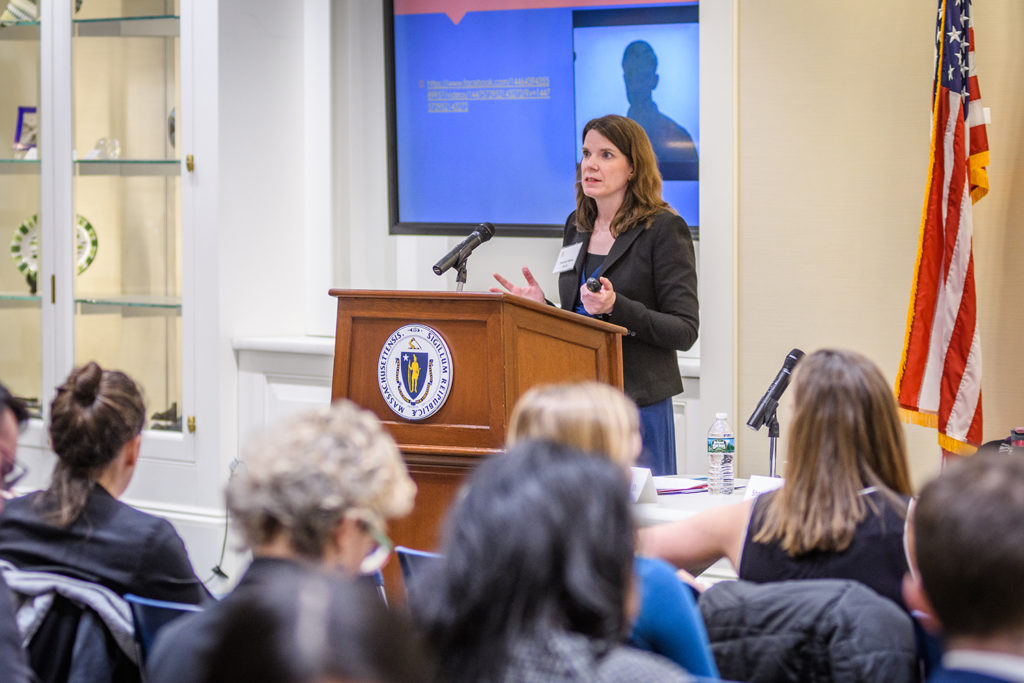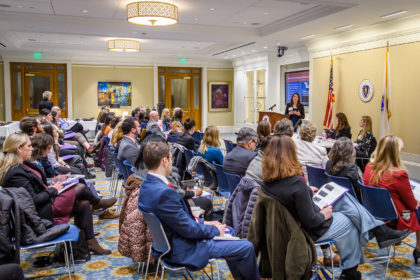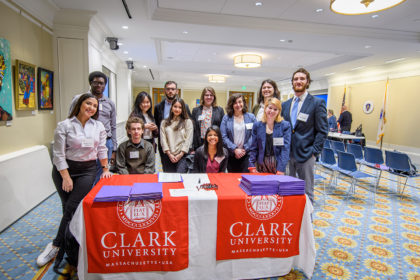Family Impact Seminar tackles issue of sexual assault on college campuses

Lawmakers, legislative staffers, students, and community members gathered in the Massachusetts State House on March 27 for the Mosakowski Institute for Public Enterprise’s 10th annual Massachusetts Family Impact Seminar, “#MAToo: Addressing Sexual Assault on College Campuses in Massachusetts.”
The seminar offered perspectives on two sets of bills in the Massachusetts Legislature addressing the ways colleges and universities handle sexual misconduct on their campuses with the goal of enhancing transparency, outreach, prevention, and intervention.
Denise A. Hines, Ph.D., the director of the Massachusetts Family Impact Seminars, associate research professor of psychology at Clark University, and co-founder of the Clark Anti-Violence Education (CAVE) Program, noted that federal regulations regarding cases of campus sexual misconduct are likely to loosen in the coming months, an impetus behind one of the bills filed in the current legislative session in Massachusetts.

According to the U.S. Department of Justice, approximately one in five women entering college will experience a sexual assault at some point in her college career. Multiple sources, including the Department of Justice, have found the majority of sexual assaults among college students occurs off campus.
Knowing where assaults occur is essential, Hines said, “because one of the U.S. Department of Education’s proposed changes is to absolve campuses of investigating any sexual assault that occurs off campus.”
Most prevention efforts focus on heterosexual female victims, Hines said, but research shows that heterosexual men and LGBTQ+ students are also potential victims of sexual assault. Despite these statistics, heterosexual men and LGBTQ+ sexual assault victims are less likely to seek help than their heterosexual female counterparts for a number of reasons, such as fear of being blamed and fear of not being believed. “Any comprehensive policy approach needs to consider the needs of victims who do not fit our stereotypes of the typical victim of sexual assault,” Hines said.
Two bills pending in the Massachusetts legislature would make campus sexual assault climate surveys mandatory. According to Hines, these anonymous, self-report surveys provide a more accurate assessment of the rates of sexual assault on college campuses and provide valuable information to college administrators regarding how best to address the issue.

Sharyn J. Potter, Ph.D., MPH, executive director at Prevention Innovations Research Center and professor of sociology and women’s studies at the University of New Hampshire, said the mental and physical health consequences suffered by victims of sexual assault can dramatically impede their ability to complete their education and meet their career goals. “Research with campus sexual assault victims, ages 24 to 65, showed that one-third of the participants never finished college, and over half experienced a disruption in the timeline to obtain their degree,” Potter said.
To reduce sexual assault rates on campus, comprehensive sexual violence prevention strategies must be administered to students throughout their undergraduate careers, she said. Bystander intervention programs that encourage campus-wide participation are particularly valuable. “We know that campus sexual assault is preventable. We also know that the key components of effective prevention efforts require community members to have knowledge of the problem, be able to identify the problems, and have the skills to intervene when they see sexual assault occurring, about to occur, or in the aftermath of an occurrence.”
Potter proposed a three-component approach:
- Policies and procedures to help victims of trauma
- Policies and procedures that enable due process for the accused
- Comprehensive prevention strategies.
Alison C. Cares, Ph.D., associate professor of sociology and criminology at Assumption College and visiting scholar at the Wellesley Centers for Women’s Justice and Gender Based Violence Research Initiative, said studies have uncovered high rates of sexual violence against female students in institutions of higher education as far back as the 1980s. “Although there is no evidence that sexual assault on campus has increased, tolerance for it has decreased,” she said.
Cares cited a number of persistent challenges:
- Lack of training for administrators who are designated to investigate and adjudicate sexual assault cases
- The cost of providing a response to campus sexual assault, which can put economic pressure on small colleges
- The weaker institutional response to sexual assault involving students who are members of historically marginalized groups
- Balancing the rights of the accusers and the accused.
“One universal challenge related to all of these issues is the lack of research on the response of institutions of higher education to campus sexual assault,” Cares said. “We need to know more about every step in the process, and how those steps can vary by type of student, type of state, and type of institution. When policy changes are undertaken — whether at the institutional, state, or federal level — every effort should be made to study the impact of those changes on outcomes.”


